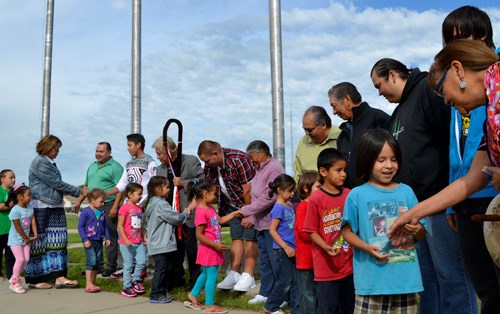A traditional flag-raising ceremony marked the start of the school year Sept. 3 at White Bear Education Complex. Staff and students surrounded the school's three flag poles as flags from White Bear First Nations, White Bear Education Complex, and the Canadian flag were raised by educator Everett Standingready, student Ty Littlechief, and teacher Chris Stevenson in the presence of Chief Brian Standingready, Elder Nora Kakakaway, parents, and members of the community.
As School Elder, Kakakaway (affectionately known as "Grandma Nora" to students), said a prayer in Cree.
White Bear First Nations Chief Brian Standingready then greeted the students, saying: "Welcome to our school-your school-especially the little ones who are just beginning. Your teachers are here to teach you the skills you need. We want you to try your very hardest. We want to see the best for all of you and we wish you all a very good year."
"We're proud that you're part of our school."
White Bear Education Complex principal Murray Bird says the annual flag-raising ceremony at the start of the school year is an important part of the school's calendar and an example of the school's commitment to giving its 160 students an education rooted in First Nations traditions and culture.
"We're a First Nations school," says Bird. "One hundred per cent. We focus on First Nations education. We use a lot of the ceremonies and traditions in our classrooms. We implement as much First Nations content as possible. It's quite evident in the school. We go beyond what the Saskatchewan curriculum tells us to do."
"We go above and beyond. Being First Nations people, we want our children to know our culture."
The school's cultural advocate Josh Kakakeway agrees. "Any person, no matter what their ancestry, it's always best to know your background, culture, and language. This is the same way with First Nations people. The residential schools took a lot of that away from our parents and grandparents. We're trying to bring it back to our children and young people."
"Some of our young people in the cities are lost," adds Kakakeway. "If you know yourself and have your education, you're one step ahead. That's what we're trying to do here."
Kakakeway says the flag-raising ceremony is symbolic for many reasons. The three flags raised are the White Bear First Nation flag, the White Bear Education Complex flag, and the Canadian flag. The prayer by School Elder Nora Kakakaway is delivered in the Cree language. The Chief, Brian Standingready, brings the Eagle Staff.The four feathers on the Eagle Staff represent the four tribes who make up the White Bear First Nation: the Assiniboine, the Cree, the Saulteaux, and the Sioux. Three songs are performed by traditional drummers during the ritual: the Flag Song, the Victory Song (during which participants dance) and finally, the Honour Song. At the end of the ceremony, every student and staff member shakes hands with the chief and the elders.
"Respect is a key word here," says Bird. "It's a part of our everyday endeavours here at the school. Elders and cultural advocates talk to the kids about values and our teachers are totally committed to all of our community events. All of my staff go and fully participate. It's an expectation if you want to work here."
"Education is our main goal," says Bird. "But as a First Nations school, we can also include outdoor activities in our curriculum that emphasize our traditions and values within that education. For example, next week, I will be taking nine high school boys on a hunting trip. They will be providing elders and non-hunters with meat for the winter. We can do that at a First Nations school."



